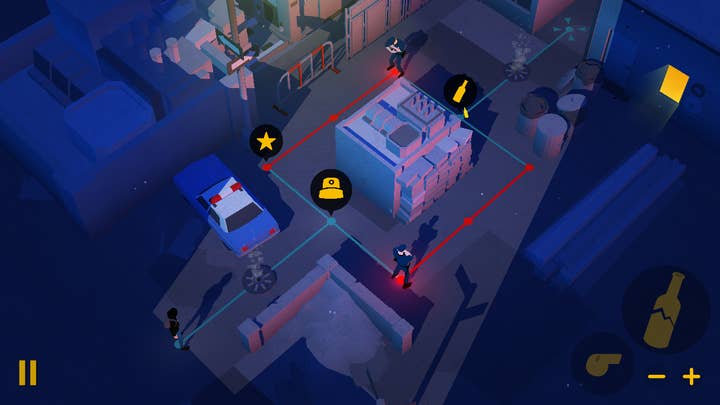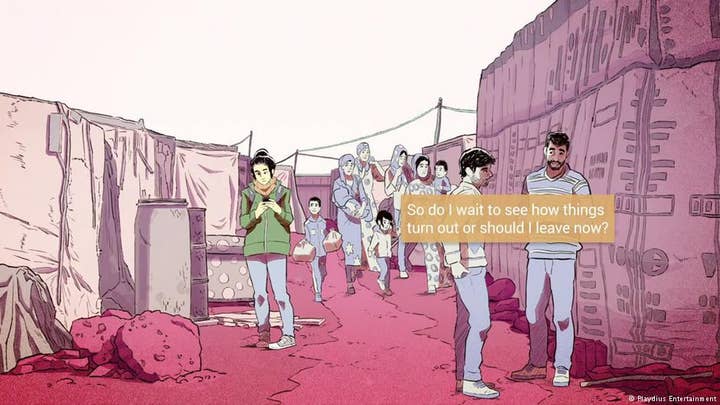The European TV channel making documentaries with video games
Arte project manager Adrien Larouzée tells us why games are the perfect storytelling media to spread culture from the continent
Most broadcasters that get involved in video games are solely looking for a way to extend their brands, to capitalise on their successes and engage with their fanbases (That's why a mobile spin-off of Love Island is unforgivably high in the mobile charts right now).
But some TV firms genuinely see the merits of our medium, the advantages it has over theirs, and the ability for games developers to reach and connect with people in a way that the small screen never can.
One such firm is Arte, a Franco-German TV channel that describes itself at a "cultural European digital network". Primarily operating in the TV space since 1992, the company has spent years looking for new ways to tell its stories and provoke discussion, adapting to the digital age with web documentaries and series, virtual reality projects and interactive fiction.
"[Type:Rider was] a great success and from that point we were really convinced this is a medium that we should support the same way we support documentaries"
The most prominent example of the latter is last year's Bury Me, My Love: a harrowing mobile game that takes players through the journey of a Syrian refugee through the eyes of the husband she's texting at home. It's been met with critical acclaim, but this is not the first time Arte has used a video game to explore an unusual subject.
Instead, the firm's games debut was Type:Rider, a platforming adventure that explores the history of typography, with players navigating key historical periods and meeting important figures from those times. For project manager Adrien Larouzée, it was a launch that changed the direction of the company.
"It was a hit, a great success and from that point we were really convinced this is a medium that we should support the same way we support documentaries and fiction in other visual media," he tells GamesIndustry.biz.
Since then, Arte has been experimenting with the other information it can convey through video games, such as with Californium: a first-person exploration game based on the life and works of iconic sci-fi author Philip K. Dick. Following the award-winning Bury Me, My Love, the broadcaster has ramped up its efforts in games, with the release of two new titles over the past few months: Vandals and Homo Machina.

When you first look at Vandals, from Type:Rider developer Cosmografik, you might be confused as to how it fits into Arte's goal of creating documentaries in video game form. The puzzle title is a Hitman Go-style turn-based affair where players must stealthily sneak around police officers and leave graffiti in selected places. But Larouzée says the game has much more substance than you might think.
"Actually Vandals is talking about European culture too, in terms of street art," he explains. "There are 20 real-life artists in the game that you can find, there are five cities emblematic of the history of street art - Paris, New York, Berlin, Sao Paolo and Tokyo - and by visiting those cities, you will discover that history.
"The word for game in French implies fun. If you say you're going to play with the life of migrants, that's something that could be really misunderstood"
"For example, the Paris levels take place in 1968, while Berlin is focused on what happened on the Wall in terms of street art, and in New York it's the birth of graffiti during the hip hop generation. This is a way to discover the history of street art by playing an infiltration game. So it's still cultural."
There's no denying Vandals is the one of the most game-like releases from Arte so far, but even the term 'video game' can sometimes undermine what the company is trying to accomplish.
In the case of Bury Me, My Love, the project was actually referred to as 'interactive fiction' throughout the marketing campaign. This is not to distance the release from video games as a medium, as if there were some kind of stigma about the industry among Arte's customers, but instead down to a quirk of language. Specifically, the French word for 'game' being 'jeux', which also translates as 'play'.
"This is something I talk about a lot with English-speaking people, and it's kind of semantic: the word for game in French implies fun," says Larouzée . "In English, the word means a set of rules, not something that's specifically meant to be fun. In French, if you say you're going to play with the life of migrants, that's something that could be really misunderstood.
"We needed to make sure the game - and I really think it's a game - we wanted to make sure nobody took it in the wrong way. I guess it's more sensitive when you say it in French, and we didn't want any confusion about it. So by calling it an interactive fiction, it sounded more respectful."

With Arte adamant that its releases are video games, this brings up the subject of balance: their titles need to both be informative and serve their role as documentaries but also be enjoyable to play as games in their own right.
For Larouzée, this is one of the biggest challenges with each project and demands a somewhat restrained approach when dealing with the subject matter.
"[We need] to fine tune the gameplay, the scenario and the art direction properly to stay entertaining and somehow not to be so pushy," he says. "We want to make you curious about things. For example, in Vandals, the documentary aspect is a game inside a game, it's through hidden objects and so on. I'm sure playing Vandals will make you curious about the history of street art or the emblematic figures, cities and periods of time.
"By the end [of Vandals], maybe you'll have learned a thing or two. Maybe you'll have changed you mind about street art - is it vandalism, or a form of art that we should recognise?"
"By the end, maybe you'll have learned a thing or two. Maybe you'll have changed you mind about street art - is it vandalism, or a form of art that we should recognise?"
Arte's most recent release, Homo Machina, takes the firm even further into traditional video game territory. The puzzle game is heavily story-driven and takes players through a day in the life of a man working up to an important date in the evening. Inspired by the infographics of Fritz Kahn, who specialised in depicting the human body in relatable machine terms, players are presented with a series of puzzles and sequences they need to complete in order to keep the body operational.
Again, when playing Homo Machina, the documentary aspect may not be immediately be apparent thanks to the charming presentation of its story and the objective-driven journey through all the bodily functions, but Larouzée is confident the game's point comes across as you progress.
"This game is far more narrative than Vandals, but in a way by exploring the body and exploring those analogies, you will discover the heart of Fritz Kahn and what we wanted to do," he says. "It's a tribute to his legacy, and we want to raise awareness of who he was and what he did a century ago."
It's been five years since Type:Rider marked Arte's games industry debut but the broadcaster is showing no signs of slowing. Larouzée tells us there are "four or five more games" due to be released across 2018 and 2019 - and the firm is still on the hunt for "more projects from young creators with strong storytelling and gorgeous art direction."
"Allowing people to access a significant portion of the game for free is as important as the commercial success"
The emphasis on "young creators" is no accident; Arte is determined to support independent studios, particularly those that may be working on some of their first titles. This, Larouzée tells us is "an almost philosophical position" for the broadcaster.
"We want to reward the creativity of those tiny studios that need funding they wouldn't be able to find somewhere else," he explains. "Those tiny games that wouldn't make commercial sense for big companies and publishers. If they're looking for a door to knock on, this is where we belong."
Yet the commercials of such projects are not a high priority for Arte. Despite the critical acclaim and the many accolades to its name, by the developer's own admission Bury Me, My Love has yet to achieve commercial success. With most publishers, this would be a cause for concern, but Arte's other businesses gives its games projects much more leeway.
"Arte is publicly funded," Larouzée explains. "This has been a public service TV channel from the beginning. The projects we're supporting, the way we support that is with public money, and we want to give it back to the people, the French and Germans who pay their taxes.
"The visibility of the project is more important than the commercial success. For example, with Bury Me, My Love we gave away a free prequel to the game - that was our democratic way to broadcast the project and give it visibility. For Vandals, you can play the first city Paris entirely for free with a demo for PC and Mac.
"Allowing people to access a significant portion of the game for free is as important as the commercial success. Commercial success is something we're still looking for because we want to support the creators we are helping but at the same time, we're trying to maximise the visibility we can give for free."

